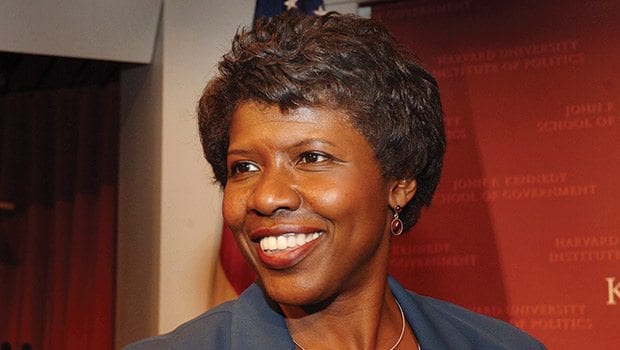Pioneering journalist Gwen Ifill dies at 61
Career began with gig at Banner in ’70s

From humble beginnings as the daughter of Caribbean immigrant parents and a graduate of Springfield High School, Gwen Ifill soared to the top of her profession as a political journalist, moderating political debates and hosting “Washington Week in Review” on PBS — the first black woman to host a national weekly news program.
Ifill died Monday in hospice care after a struggle with endometrial cancer. Her professional career, which began in Boston, served as an inspiration to many in the field.
“Ifill was a Banner and Herald alum, went on to the top of the profession and did it with grace and professionalism,” said journalist and former Banner managing editor Robin Washington.
A 1977 graduate of Simmons College, Ifill got her start in journalism at the Banner, before moving on to the Boston Herald and the Baltimore Evening Sun, where she covered the 1988 presidential bids of Jesse Jackson and televangelist Pat Robertson.
Presidential coverage
In 1992, Ifill moved to the New York Times, covering then-Arkansas Gov. Bill Clinton’s bid for the presidency. After Clinton’s election, she became a Washington correspondent covering the White House. In 1994, she then moved to broadcast journalism, covering Washington for NBC. That move led in 1999 to a position as moderator of “Washington Week in Review,” where Ifill had served frequently as a panelist. At the same time, she served as a correspondent for The News Hour With Jim Lehrer.
While the PBS show did not have the wide following NBC had, Ifill enjoyed the greater depth of coverage she was afforded in public television. She also gained the respect of her fellow journalists and was tapped to moderate two vice presidential debates — the 2004 vice presidential debate between incumbent Dick Cheney and Sen. John Edwards and the 2008 debate between Alaska Gov. Sarah Palin and Sen. Joseph Biden.
When in 2013, Ifill and journalist Judy Woodruff became co-anchors of “PBS Newshour,” it was the first time a national news program was hosted by two women. Ifill launched that gig with an interview with President Obama.
For many black journalists, seeing Ifill at the top of the profession was a matter of pride.
“It’s obvious to anyone who ever watched The News Hour or her other national broadcasts that she was an icon and an exemplar of journalism the way it should be practiced,” said Washington, a former board member of the National Association of Black Journalists. “I couldn’t watch her without feeling pride.”
Ifill was born in 1955 to a Panamanian father and Bajan mother. Her father, an itinerant preacher, became pastor of one of the largest churches in Springfield.
She began working at the Banner during school desegregation, writing about Boston during one of its more turbulent times. Banner Publisher Melvin B. Miller was not surprised that the young graduate was up to the task.
“Years ago, major newspapers were not excited about hiring black reporters,” Miller said. “As a consequence of this discrimination, small papers like the Bay State Banner had the privilege of being the employer of many highly talented journalists. Reporters like Gwen Ifill were able to launch their journalistic careers without being assigned to writing obituaries. We were pleased to have her at the Banner, but we were aware that we couldn’t retain such a talent for too long.”







